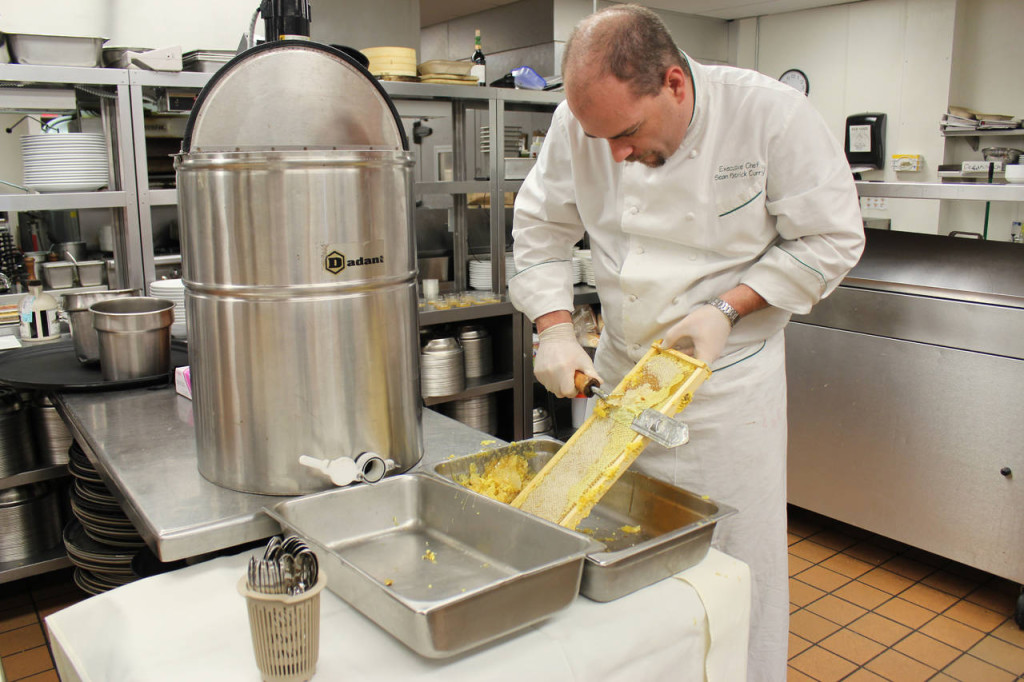Beehives kept at hotels have been abuzz for a few years, but now properties are heading beyond harvested honey served at breakfast. At the Hilton Chicago/Oak Brook Hills Resort & Conference Center, executive chef Sean Curry focuses on the sustainability aspect of beekeeping. This spring, he is installing 10 beehives throughout the hotel’s 150- acre Audubon-certified Cooperative Sanctuary. While honey will headline the chef’s signature modern farm cuisine, by-products will also be used, like wax for candles and a honeycomb display for banquet functions.
“Taking care of bees allows them to take care of us,” says chef Curry, who also plans to hold educational seminars on the benefits of beekeeping in local schools. In London, guests of St Ermins Hotel – where more than 300,000 buckfast bees reside in three custom- built hives on its third-floor terrace – can learn the basics of beekeeping with the “Bees in the Burbs” taster workshop, led by the hotel’s bee guru (£25 per person for a 2.5-hour workshop, with a honey cocktail in the Caxton Bar).
New York offers “Milk, Haute Honey and Rooftop Herb Manicure and Pedicure”, a roof-to-spa concept that utilises ingredients from the hotel’s 20th-floor rooftop beehives and garden, including the honey from its own six apiaries.
California’s 500-acre Carmel Valley Ranch, with an apiary that is home to 60,000 Italian honey bees, offers a signature beekeeping experience ($60 per adult) with a resident lavender farmer and beekeeper who takes guests into the apiary (in beekeeping suits) where they taste honey straight from the hives. In Georgetown, beekeeping goes beyond serving BeeTinis, the signature cocktail at Fairmont Washington, D.C. The hotel supports the DC Public Schools’ Junior Beekeepers initiative, plus this spring it is adding a pollinator bee hotel, a collection of nesting materials designed to attract, support and protect native, lost and solitary bees, to its collection of rooftop honeybee hives.
To raise awareness about the dwindling bee population and help sustain it, the 500-room Radisson Blu Mall of America is collaborating with the University of Minnesota’s Bee Squad.
“We will have ‘bee-customised’ rooms looking out onto the hives, with pictures of honey and the colonies, colouring books for the kids, as well as honey amenities,” says executive chef Paul Lynch of FireLake Grill House & Cocktail Bar, who is spearheading this endeavor.
Hotels are even starting to brand their own honey. With a thriving 200-colony operation spread over the resort, Puntacana Resort & Club in the Dominican Republic produces several hundred gallons of polyfloral PUNTACANA Forest Honey, used in dishes, cocktails and spa treatments on site and sold at other locations in the country. Honey is also starting to make its debut in hotel spa treatments. At its on- site Guerlain Spa, the Waldorf Astoria New York offers “Milk, Haute Honey and Rooftop Herb Manicure and Pedicure”, a roof-to-spa concept that utilises ingredients from the hotel’s 20th-floor rooftop beehives and garden, including the honey from its own six apiaries.
California’s 500-acre Carmel Valley Ranch, with an apiary that is home to 60,000 Italian honey bees, offers a signature beekeeping experience ($60 per adult) with a resident lavender farmer and beekeeper who takes guests into the apiary (in beekeeping suits) where they taste honey straight from the hives.
In Georgetown, beekeeping goes beyond serving BeeTinis, the signature cocktail at Fairmont Washington, D.C. The hotel supports the DC Public Schools’ Junior Beekeepers initiative, plus this spring it is adding a pollinator bee hotel, a collection of nesting materials designed to attract, support and protect native, lost and solitary bees, to its collection of rooftop honeybee hives.


